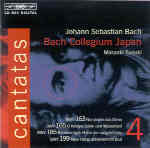In this fourth volume of the Bach Collegium Japan’s Bach cantata series we encounter one of the composer’s most esteemed and frequently recorded works: Mein Herze schwimmt im Blut BWV 199. Of course, this begs the question, “How does it compare with so many other great previous recordings of the piece?” The answer is: very well. Soprano Midori Suzuki possesses a fine voice with a clear, light top that easily manages the wide range of expression Bach requires. While smaller-scaled than most, her rendering of the difficult fourth-movement aria “Tief gebückt und voller Reue” is as fluid as any, with every lengthy phrase beautifully sustained. Likewise in the joyous final aria “Wie freudig ist mein Herz” her voice romps with wonderful zeal and vigor. Those expecting a more full-bodied treatment of this aria (Stader, Zylis-Gara, or even Ameling or Auger she ain’t) may be disappointed, though given Suzuki’s lighter, more youthful-sounding timbre, her rendering arguably characterizes the subject more convincingly.
While lesser-known, the remaining cantatas–BWV 163, 165, and 185–receive equally heartfelt performances. Although I was initially disappointed at the absence of countertenor Yoshikazu Mera on this volume, the return of Akira Tachikawa (who sang two brief arias on Volume 1) put to rest any doubts as to the continued excellence of the solo singing. Though marginally whiter in tone compared to Mera, Tachikawa is a very capable singer, shown most notably here in his two duets with soprano Aki Yanagisawa in BWV 163.
Repeated listening to these performances not only substantiates Masaaki Suzuki’s brilliance as a Bach conductor and confirms the expertise of his team of instrumentalists and vocalists, but also demonstrates the virtues of the Shoin Women’s University Chapel as a recording venue, advantageously exploited by BIS’s superior engineering team. As with the previous volumes, this is a set that no serious Bach enthusiast should miss.
































